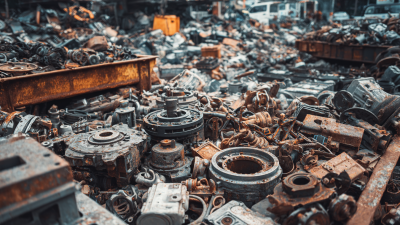Blog
Unlocking Sustainability: How Car Recycling Parts Contribute to a Greener Future
The transition towards a sustainable future is becoming increasingly crucial in the automotive industry, with car recycling parts playing a pivotal role in reducing environmental impact. According to the Automotive Recyclers Association, approximately 95% of a vehicle's parts can be reused and recycled, significantly decreasing the demand for new materials and reducing landfill waste. Furthermore, the Global Recycling Foundation reports that recycling one vehicle saves up to 1,200 kg of CO2 emissions, highlighting the importance of implementing effective car recycling practices. As the world shifts towards greener initiatives and policies, the focus on car recycling parts not only minimizes resource consumption but also fosters a circular economy, ultimately contributing to a more sustainable ecosystem. Embracing the potential of recycled auto components is essential in mitigating climate change and ensuring that automotive manufacturing aligns with environmental stewardship.

The Role of Car Recycling in Reducing Landfill Waste and Environmental Impact
Car recycling plays a pivotal role in reducing landfill waste and mitigating environmental impact. By reusing valuable materials from end-of-life vehicles, the process not only diverts waste from landfills but also minimizes the consumption of raw resources. This shift towards a circular economy helps decrease greenhouse gas emissions and supports sustainable development. As the global market for recycled materials, including carbon fiber reinforced plastics (CFRP), grows—projected to reach $644.5 million by 2033—the importance of effective recycling practices becomes increasingly evident.

Tips for Sustainable Car Disposal:
1. Always consider recycling your vehicle instead of disposing of it in a landfill. Many parts can be salvaged and reused, significantly lowering their environmental footprint.
2. Look for certified auto recycling facilities that prioritize eco-friendly methods and ensure that hazardous materials are disposed of safely.
3. Participate in local community initiatives that promote recycling and waste reduction, which can help bring awareness and support for sustainable practices in vehicle disposal.
Quantifying the Economic Benefits of Recycling Auto Parts for the Automotive Industry
Recycling auto parts presents significant economic benefits for the automotive industry, contributing both to sustainability and financial efficiency. Recent studies indicate that the reuse of automobile components such as engines and transmissions can lead to substantial reductions in carbon emissions. This not only enhances the environmental profile of automotive repairs but also helps to strengthen domestic supply chains, reducing reliance on new parts and the associated resource extraction processes.
In particular, embracing salvaged parts can lower costs for manufacturers while meeting increasing consumer demands for sustainable practices.
Additionally, innovative methods are emerging to assess the environmental impacts of vehicle repairs. By quantifying these effects through simplified scoring systems, businesses can make more informed decisions about the parts they utilize and encourage practices that minimize ecological footprints. The recycling of automotive components is thus not merely an environmental necessity; it is an economically viable strategy, suggesting that as the automotive sector progresses, prioritizing recycling and reuse will be essential not just for compliance with regulations, but also for fostering a competitive edge in a rapidly evolving market.
Innovative Recycling Technologies: Driving Efficiency and Sustainability in Car Parts Recovery
Innovative recycling technologies are transforming the automotive industry by enhancing the efficiency and sustainability of car parts recovery. Advanced methods such as hydrometallurgy and automated shredding processes allow for the extraction of valuable materials from scrapped vehicles with minimal environmental impact. These technologies not only streamline the recycling operation but also increase the recovery rates of critical components like aluminum, steel, and plastics, reducing the need for virgin resources.
Moreover, the integration of artificial intelligence and machine learning in recycling facilities assists in optimizing sorting processes, leading to higher purity levels of recovered materials. This innovation not only boosts economic viability for recycling businesses but also contributes significantly to reducing the carbon footprint of car manufacturing. By adopting these state-of-the-art technologies, the automotive sector can move towards a circular economy, ensuring that car parts are reused and recycled effectively, which is essential for building a greener future.
The Carbon Footprint Reduction Achieved Through Effective Auto Parts Reuse Strategies
The automotive industry is undergoing a significant transformation towards sustainability, with a sharp focus on reducing carbon footprints through effective auto parts reuse strategies. According to recent forecasts, the global vehicle recycling market is projected to reach USD 85 billion by 2034. This surge highlights the critical role of recycling in enhancing circularity within the industry. Methods such as recycling, remanufacturing, and repurposing parts not only conserve resources but also minimize greenhouse gas emissions, aligning with global carbon neutrality targets.

Companies are increasingly adopting a circular economy approach, making strides toward lowering CO₂ emissions across their operations. For instance, cutting-edge facilities are rethinking the end-of-life processing of vehicles, ensuring that materials are not wasted but rather reincorporated into new manufacturing processes. Initiatives like these serve as a powerful reminder that embracing circularity can generate new value and provide a more sustainable framework for future automotive developments. As customer demands for vehicles evolve, integrating sustainable practices in auto part reuse strengthens both the market and environmental efforts, paving the way for a greener future.
Case Studies: Success Stories of Car Recycling Initiatives Leading to Greener Communities
The case studies surrounding car recycling initiatives illustrate significant progress towards fostering greener communities. For instance, various localities have adopted comprehensive programs that not only recover valuable materials from end-of-life vehicles but also reinvest in community sustainability efforts. By reclaiming metals, plastics, and glass from cars, these initiatives reduce landfill waste, promote resource efficiency, and lower the environmental impact of manufacturing new parts. Such programs exemplify how the automotive sector can play a crucial role in a circular economy, promoting biodiversity and enhancing local ecosystems.
In addition to environmental benefits, these car recycling projects often engage local populations, creating job opportunities and driving awareness about sustainability practices. Community workshops and educational campaigns inform residents about the benefits of recycling, empowering them to take part while also addressing broader climate resilience goals. The incorporation of innovative recycling methods not only exemplifies commitment to ecological sustainability but also reinforces the interconnectedness of individual actions and community health. These success stories serve as a model for how collaborative efforts in car recycling can lead to thriving neighborhoods committed to environmental stewardship.
Unlocking Sustainability: How Car Recycling Parts Contribute to a Greener Future
| Initiative Name | Location | Recycling Rate (%) | Community Impact | Year Established |
|---|---|---|---|---|
| Green Auto Salvage | California, USA | 85 | Improved air quality and reduced landfill waste | 2015 |
| EcoCar Initiative | Toronto, Canada | 90 | Community workshops on recycling | 2018 |
| ReCar Project | Berlin, Germany | 75 | Boosted local jobs in recycling sectors | 2017 |
| AutoWaste Recovery | Sydney, Australia | 88 | Reduced carbon footprint and enhanced community engagement | 2016 |
| Sustainable Vehicles Network | London, UK | 92 | Increased awareness on sustainable practices | 2019 |
Related Posts
-

Innovating Auto Recycling Strategies at the 138th Canton Fair 2025 Insights and Industry Data
-

The Ultimate Guide to Choosing Quality Car Auto Parts for Your Vehicle's Long Life
-

Understanding the Impact of Quality Car Auto Parts on Vehicle Performance and Safety
-

The Future of Eco Cars Exploring Sustainable Innovations for a Greener Planet
-

Exploring the Evolution of Automotive Body Parts: From Classic Designs to Modern Innovations
-

Unlocking Opportunities in the Junk Car Parts Industry at the 138th China Import and Export Fair in 2025
Logel’s Auto Parts
116 Bridge St East
Kitchener, Ontario
N2K 1J6
Phone: 519-745-4751
Toll Free: 1-800-818-9118
Hours 8:00-5:00 Monday to Friday
At Logel’s Auto Parts, we serve a range of communities in Southern Ontario, including:



